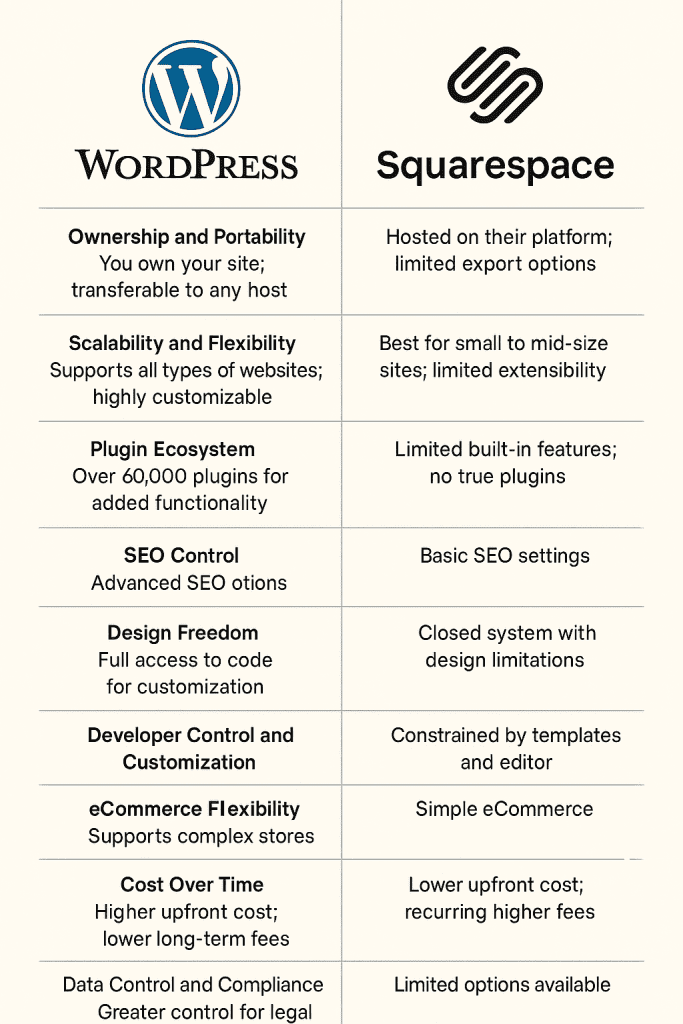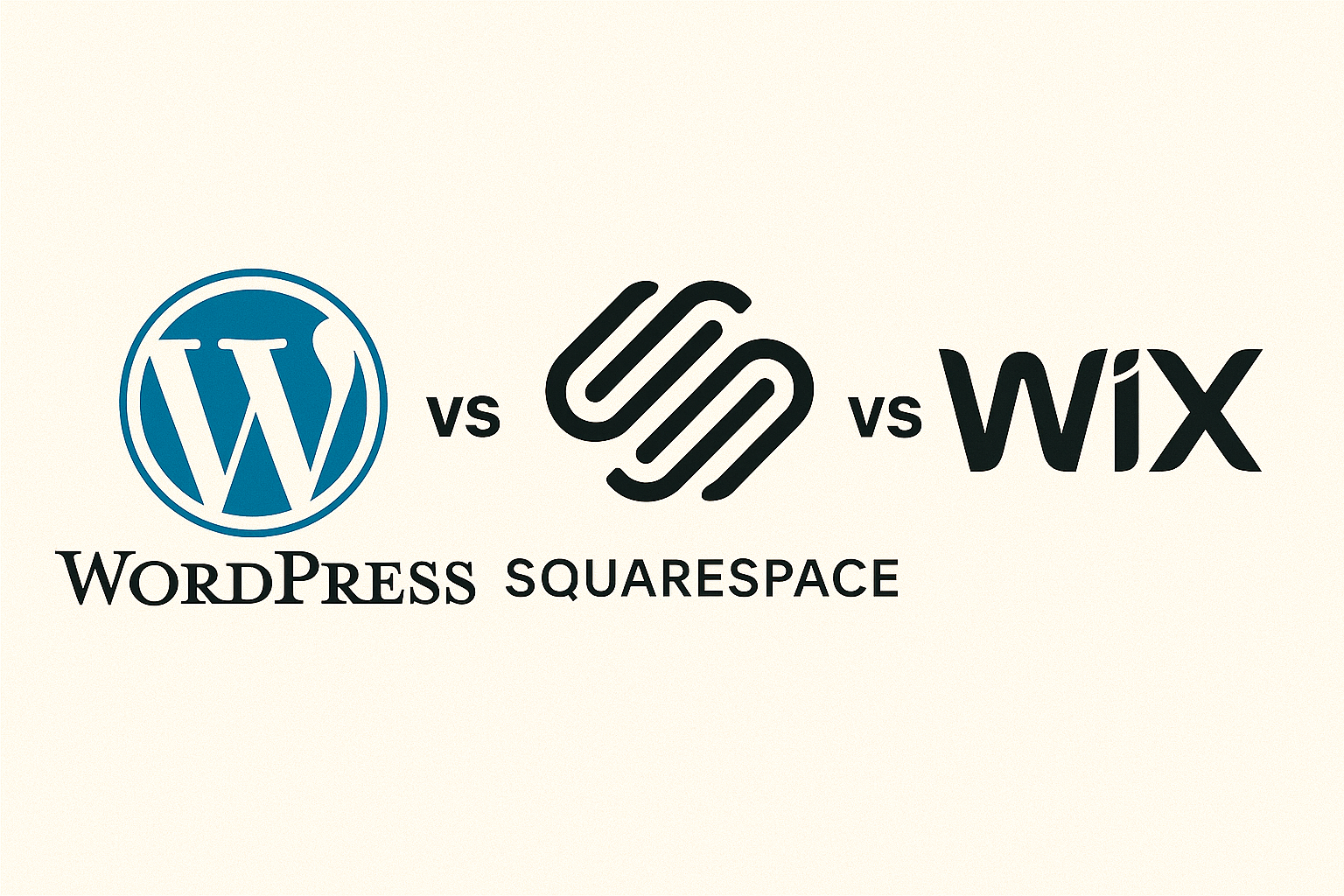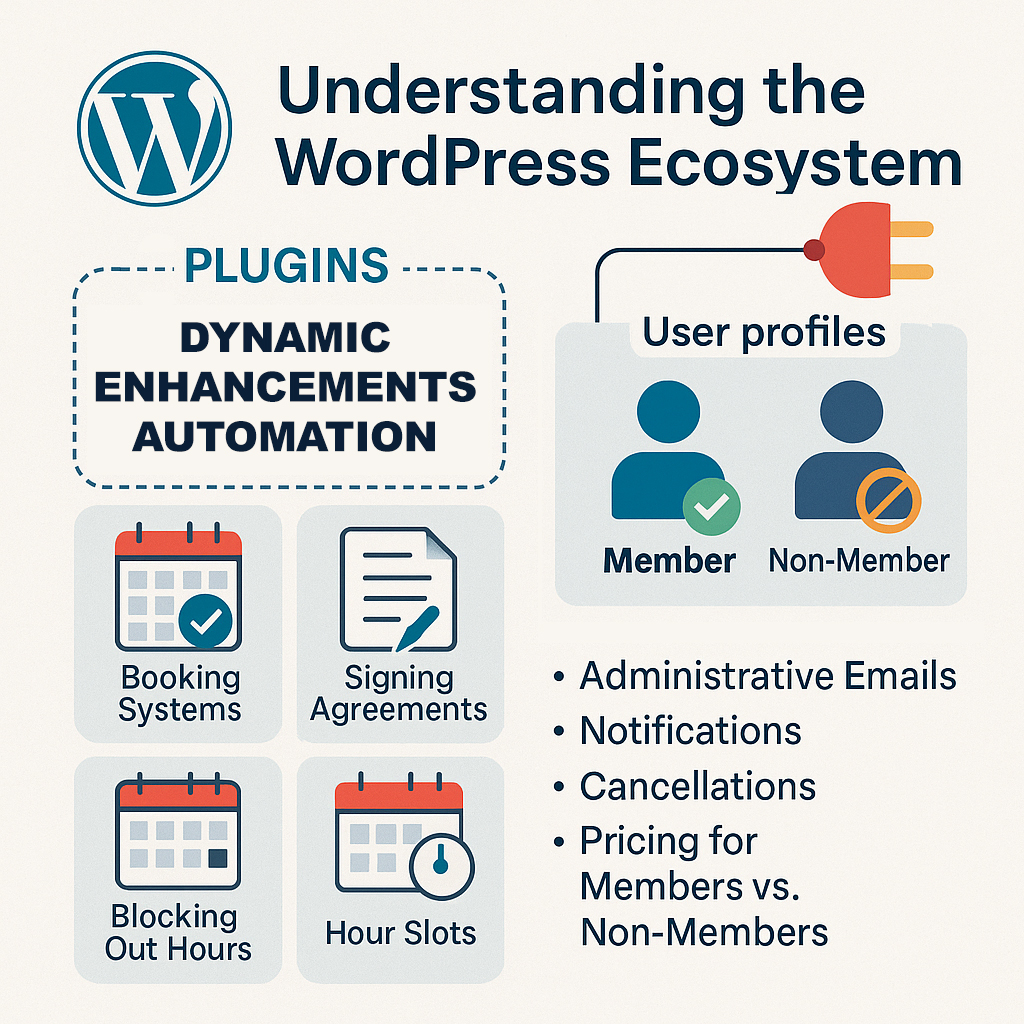I was recently asked by a new client “why I preferred WordPress over Squarespace?”
Squarespace and Wix are popular platforms for individuals, hobbyists, and small business startups looking to quickly launch a professional-looking website. They offer user-friendly, drag-and-drop interfaces, attractive templates, and all-in-one hosting—making them ideal for do-it-yourself enthusiasts or businesses with limited budgets and no immediate plans to scale. While these platforms shine in ease of use and speed of setup, they operate within closed ecosystems that significantly limit customization, third-party integrations, and long-term growth potential.
In contrast, WordPress is an open-source platform that provides unmatched flexibility and scalability. It is best suited for businesses seeking greater control over their site’s features, functionality, and future development. With WordPress, you retain full ownership and portability of your website, including the ability to host it with any provider of your choice. Unlike Squarespace or Wix, which restrict where and how your site can be hosted, WordPress supports hundreds of hosting options, giving you true long-term control and freedom.

Moreover, WordPress offers a vastly broader range of development tools and features, supported by thousands of plugins and customization options. Its ecosystem includes powerful page builders such as Elementor, Divi, Themify, WPBakery, and Beaver Builder. These builders offer similar drag-and-drop functionality, pre-designed templates, and layout tools as seen in Squarespace and Wix—but go far beyond by allowing deeper customization, integration with third-party extensions, and the ability to scale your website as your business grows.
1. Ownership and Portability
-
WordPress: You own your site, database, and code. You can move your site to any hosting provider.
-
Squarespace: Your site is hosted and locked into their platform. You can’t export most custom functionality or themes.
2. Scalability and Flexibility
-
WordPress: Supports everything from blogs to massive enterprise sites. Can grow with your business and integrate with almost anything.
-
Squarespace: Great for small to mid-size websites, but has limits on customization, functionality, and extensibility.
3. Plugin Ecosystem
-
WordPress: Over 60,000 plugins allow you to add any feature—eCommerce, memberships, SEO, learning systems, forums, CRMs, and more.
-
Squarespace: Limited built-in features and no true plugin system. You’re restricted to what Squarespace provides.
4. SEO Control
-
WordPress: Offers advanced SEO plugins like Rank Math and Yoast. You can control sitemaps, indexing, schema, metadata, and more.
-
Squarespace: Basic SEO settings. Good enough for small sites, but lacks granular control for complex SEO strategies.
5. Design Freedom
-
WordPress: Full access to the site’s code—HTML, CSS, PHP, and JavaScript—so design is limitless.
-
Squarespace: Uses a closed system with limited customization. Advanced designs are difficult without workarounds.
6. Developer Control and Customization
-
WordPress: Developers can build custom themes, plugins, and integrations tailored to business needs.
-
Squarespace: You’re constrained by templates and the in-browser editor with limited developer access.
7. eCommerce Flexibility
-
WordPress (via WooCommerce): Supports complex stores, multi-vendor platforms, custom checkout flows, payment gateways, and advanced inventory systems.
-
Squarespace: Simple eCommerce that’s great for selling a few items but not robust for advanced commerce needs.
8. Cost Over Time
-
WordPress: Higher upfront cost (hosting + development), but long-term savings and full control.
-
Squarespace: Lower upfront cost but recurring monthly fees with paywalls for certain features, making scaling more expensive.
9. Data Control and Compliance
-
WordPress: Easier to implement GDPR/CCPA compliance, privacy policies, and custom cookie consent tools.
-
Squarespace: Some features available, but limited options for deep legal compliance or data control.
10. Community and Support
-
WordPress: Backed by a global community, tons of tutorials, forums, developers, and agencies.
-
Squarespace: Good support, but you’re limited to their team and documentation.
Business Type
Small brochure site, minimal features
Custom business site, future growth expected
eCommerce with basic needs
eCommerce with complex needs
SEO-critical site (local biz, blog, media)
Marketing site with integrations
Best Platform
Squarespace
WordPress
Squarespace
WordPress
WordPress
WordPress
This article was reviewed and refined with the assistance of AI tools to help ensure clarity, structure, and grammatical accuracy. All ideas and opinions remain solely those of the author.
Trademark Notice
WordPress is a registered trademark of the WordPress Foundation.
Squarespace is a registered trademark of Squarespace, Inc.
Wix.com is a registered trademark of Wix.com Ltd.
All trademarks, service marks, trade names, and logos appearing in this article are the property of their respective owners. Their inclusion does not imply any affiliation with or endorsement by the trademark holders.





